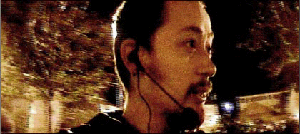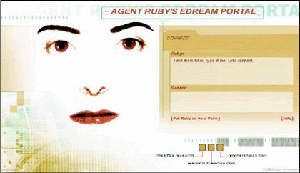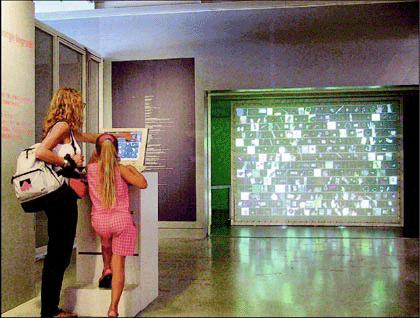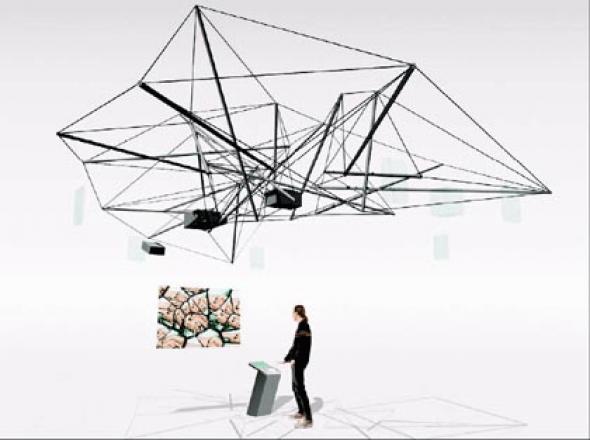DEAF 2003: Data Knitting
During the  DEAF evening programme curated and hosted by Sadie Plant, artist Brian Duffy showed us the secret, electronically musical, lives of toys he’d purchased for a pound or less at car boot sales and flea markets in and around Birmingham. I couldn’t help but feel a ‘Eureka’ moment wash over me as I watched him solder wires together to get new melodies out of the pre-programmed functions of the old Casio keyboard he was handling. It was as if the elusive feminist cyber-theorist had unearthed for us a national treasure: Duffy’s work and thought process reads as a perfect contemporary personification of the Heideggerian philosophy of technology - that which was ready-at-hand can, with the flick of a switch, be made present-to-hand, revealing the third mind of the material with which one is ‘collaborating’. The festival as a whole seemed to be almost entirely concerned with this type of weaving (obvious analogy, sorry). Philosophies of the latent and implied use values of technologies (casio keyboards, databases, archives, the Internet, software) were interlaced with their practical and socio-economic applications (the generation of new knowledge, new sounds, pictures and even communities). On one side, in the symposium, stood Manuel de Landa and Scott Lash, deftly explaining the theoretical differences between classical and contemporary archives (the former are symbolic, uphold tradition, and classify truth, the latter are semiotic, collective, and hence indexical to the real). On the other side, in the exhibition, stood the art works of Josh On & Futurefarmers (They Rule, 2001) and Jonah Brucker-Cohen (Policestate Carnivore Client, 2002), each mining data networks for information on the structure of multinationals or the FBI’s blacklist of ‘terrorist’ trigger-terms.
DEAF evening programme curated and hosted by Sadie Plant, artist Brian Duffy showed us the secret, electronically musical, lives of toys he’d purchased for a pound or less at car boot sales and flea markets in and around Birmingham. I couldn’t help but feel a ‘Eureka’ moment wash over me as I watched him solder wires together to get new melodies out of the pre-programmed functions of the old Casio keyboard he was handling. It was as if the elusive feminist cyber-theorist had unearthed for us a national treasure: Duffy’s work and thought process reads as a perfect contemporary personification of the Heideggerian philosophy of technology - that which was ready-at-hand can, with the flick of a switch, be made present-to-hand, revealing the third mind of the material with which one is ‘collaborating’. The festival as a whole seemed to be almost entirely concerned with this type of weaving (obvious analogy, sorry). Philosophies of the latent and implied use values of technologies (casio keyboards, databases, archives, the Internet, software) were interlaced with their practical and socio-economic applications (the generation of new knowledge, new sounds, pictures and even communities). On one side, in the symposium, stood Manuel de Landa and Scott Lash, deftly explaining the theoretical differences between classical and contemporary archives (the former are symbolic, uphold tradition, and classify truth, the latter are semiotic, collective, and hence indexical to the real). On the other side, in the exhibition, stood the art works of Josh On & Futurefarmers (They Rule, 2001) and Jonah Brucker-Cohen (Policestate Carnivore Client, 2002), each mining data networks for information on the structure of multinationals or the FBI’s blacklist of ‘terrorist’ trigger-terms.


Sadie Plant stated that she hoped to demonstrate William Gibson’s adage that ‘the street finds its own use for things’, but at the same time continually reflect on the fact that we live in a world not of ‘things’ but of ‘relations’. This opening gambit proved useful for a reading of most of the works in the exhibition, ‘From Wunderkammer to Metadata’. Some demonstrations of this field of relations were downright awful: Jeffrey Shaw’s travelling production Web of Life (2002), which is lauded as an interdisciplinary networked generative project but appears as a fancy scanner and 3D projection of ‘organic patterns’, giraffes and landscapes imperceptibly based on the lines in the visitor’s hand; and Geert Mul’s 100,000 Streets (2002), another ‘kaleidoscopic’ ‘honeycomb’ of images (this time of cities around the world), found via an alternative web browser but triggered across the bank of TV screens by the visitor stepping repeatedly on a black rubber platform. Others were charmingly obvious if dated: the now seminal cumulative and non-hierarchical database of everyday objects, Pocketful of Memories by George Legrady (2001) or Thecla Schiphorst and Susan Kozel’s V2-produced project Whisper (2003), which allows six participants wearing ‘intelligent garments’ to interact with one another and - through their proximity, movements and breath patterns - make visible and audible their digital effects on the network linking them together.
Taken together, these works, presentations, and the comments of the symposium invitees (who included Brian Massumi and Arjun Appadurai) showed the rift in the weft of the discursive fabric around data knitting: can technology be both latent (i.e. have inherent characteristics which we seek to expose and make manifest) and modifiable? Or, more accurately, are we really modifying and changing the structures of the technologies when we knit them together into a network, or is this process one of necessary collaboration with technology’s latent potential? More research is clearly needed.

Dutch Electronic Art Festival (DEAF) 3: Data Knitting // 25 February – 9 March 2003 // Various locations in Rotterdam and Eindhoven, The Netherlands
DEAF [http://deaf.v2.nl]
Mute Books Orders
For Mute Books distribution contact Anagram Books
contact@anagrambooks.com
For online purchases visit anagrambooks.com








